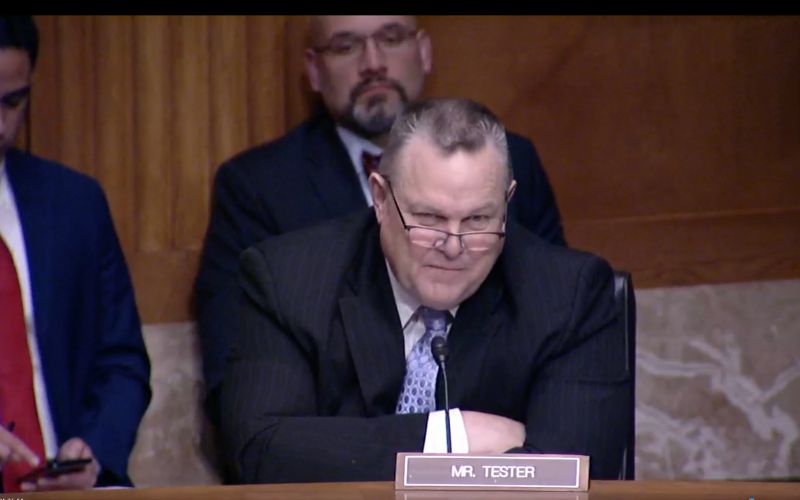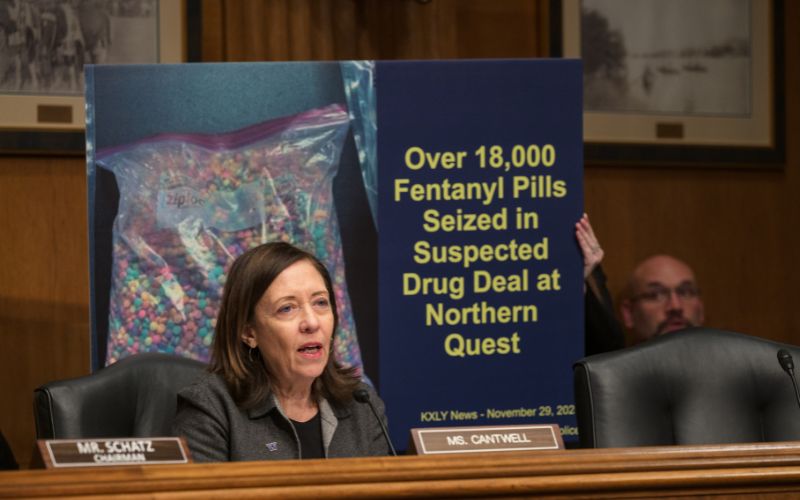
- Details
- By Elyse Wild
Tensions rose on Wednesday at a Senate Committee on Indian Affairs oversight hearing on the ongoing crisis of fentanyl — a deadly synthetic opioid 100 times stronger than morphine — in Indian Country.
The Dec. 6 hearing was a follow-up to last month's oversight hearing that brought forth a Native perspective on addressing the ongoing crisis, including testimony from Tribal leaders across the country.
In 2021, American Indians and Alaska Natives experienced the highest rate of opioid overdose deaths among any racial or ethnic population, according to the Centers for Disease Control and Prevention. More than 1,300 Native lives were lost due to overdose that year.
Yesterday's hearing brought federal voices to the table, with a panel composed of Deputy Director of the White House Office of National Drug Policy Adam W. Cohen; Indian Health Service Director Rosalyn Tso (Diné); U.S. Attorney, Eastern District of Washington Vanessa Waldref; and Bureau Deputy Director, Bureau of Indian Affairs (BIA) Glen Melville (Makah Tribe).
 Make A Donation Here
Make A Donation Here
Much of the discussion centered around the gaping disparities in Tribal law enforcement resources and checkerboard jurisdictions that make Indian reservations ideal operating centers for drug traffickers. Lawmakers, who are responsible for funding the agencies that deliver resources to Indian Country, grilled the panelists on how effective their programs are in mitigating the fallout from the fentanyl crisis in Native communities.
Before the hearing began, Committee Chairman Brian Schatz (D-HI) gave brief remarks, referring to the breadth of issues that leave Indian Country vulnerable to drug trafficking and opioid addiction: checkered jurisdiction, minimal data, barriers to healthcare resources, housing insecurity, and staffing.
"Today's hearing with our federal panel is an important follow-up... we will examine the adequacy of federal resources to address the fentanyl crisis in Native communities from public safety to treatment and prevention,” Schatz said. “The United States must live up to its trust and treaty responsibilities to promote the health and well-being of American Indians, Alaska natives, and Native Hawaiians. That responsibility includes responding to modern threats, including fentanyl."
During the hearing, Sen. Maria Cantwell (D-WA) brought attention to the crisis in Eastern Washington, where tribes contend with heavy drug trafficking and high overdose rates. In September, The Lummi Nation, located on Puget Sound, saw four deadly overdoses in as many days, prompting the Tribe to take emergency measures such as enacting random traffic stops and condemning several properties known for drug activity.
 During the hearing, Sen. Maria Cantwell (D-WA) brought attention to the crisis in Eastern Washington, where tribes contend with heavy drug trafficking and high overdose rates. (photo/courtesy)
During the hearing, Sen. Maria Cantwell (D-WA) brought attention to the crisis in Eastern Washington, where tribes contend with heavy drug trafficking and high overdose rates. (photo/courtesy)
Cantwell spoke of understaffed and underresourced tribal law enforcement. Earlier in the year, she said, federal, state, local, and tribal law enforcement seized more than 100 pounds of fentanyl before it reached the Colville and Yakama Tribal communities, and just last week, officers seized 18,000 fentanyl pills outside of Spokane.
"So, make no mistake about it — the fentanyl crisis is a flood of poison entering Indian Country and communities, and it is not a crisis that our Tribes can face alone," Cantwell said. "We've heard [from] tribal leaders and their law enforcement agencies [about] how they're chronically understaffed and underresourced. And in Eastern Washington, just a handful of officers are responsible for patrolling thousands of square miles of tribal land, and they can't shoulder that burden alone."
Cantwell then posed a question to BIA’s Melville, asking if the remote nature of Tribal nations, paired with the lack of law enforcement, make reservations ideal for drug traffickers to operate.
"There is a well-known fact, in the Mexican cartels, that if you can go on to an Indian reservation and work your way into an Indian reservation … that’s an area that they know that they can try to utilize and manipulate,” Melville responded.
'Something worth considering'
Federal funding for law enforcement in Tribal communities has long been inadequate, with many Tribal agencies being forced to make due with limited staff covering large rural areas, experts say. According to the most recent data, there were 3,834 full-time sworn officers in 234 tribally operated law enforcement agencies across the United States.
Some Tribal Nations don't have their own law-enforcement agencies and instead rely on agents from regional BIA office, Sen. Catherine Cortez Masto (D-NV) said. For the tribes without their own enforcement in border states such as Nevada, where the regional BIA office also covers Colorado and Arizona, that isn't enough, Masto told the committee.
Lawmakers at the hearing focused on the High-Intensity Drug Trafficking Areas (HIDTA) program, which provides special assistance to federal, state, local, and tribal law enforcement agencies operating in areas determined to be critical drug trafficking regions.
There are 33 HIDTA regions across the U.S., including 14 that work directly with Tribal Nations. Within those 14 regions, the White House’s Cohen said, authorities have seized more than $414 million in assets over the past year. The HIDTA program has an annual budget of $290 million, with no dedicated budget set aside for Tribal Nations.
Sen. Lisa Murkowski (R-AK), vice chair of the committee, asked Cohen if there should be a set-aside: "Should there be, given the statistics, given what we know, given the impact on Indian Country, on Alaskan Natives, Native Hawaiians?"
"I think that's something worth considering," Cohen replied.
Opioid Reduction Task Force
Sen. Markwayne Mullin (R-OK), an enrolled member of the Cherokee Nation, spoke of the U.S. Department of the Interior's Opioid Reduction Task Force, launched in 2018 to crack down on drug trafficking in Indian Country. During the hearing, Mullin submitted to the record a 30-page report addressed by the task force to Congress, alleging that he hasn't heard anything from the current administration on the task force's findings.
"I haven't heard anything, not a word," Mullin said. "I helped with this task force, I brought some reality to it ... I am at a loss."
BIA’s Melville confirmed that the task force still needs to be followed up on.
"That's a problem," Mullin replied.
'This is our fault'
With 20 minutes left in the hearing, Sen. Jon Tester (D-MT) posed a question that is emblematic of the federal government's failure to meet the stated needs of Indian Country in prosecuting drug offenders.
"This has been a train wreck for a long time, through multiple administrations, regardless of which party has been in the White House," Tester said. "A lot of this falls on us, making sure that the BIA has enough resources to be competitive.
"This is not your fault. This is our fault, the folks on this side of the rostrum. It's not these folks that are the problem, every one of us here understands that we have got to have money in the budget to hire BIA officers, and if they don't have the budget ... it's on us ... we have a lot of work to do."
More Stories Like This
Native News Weekly (August 25, 2024): D.C. BriefsScope Narrowed, Report Withheld: Questions Mount Over Michigan Boarding School Study
Zuni Youth Enrichment Project Announces Family Engagement Night and Spring Break Youth Programming
Next on Native Bidaské: Leonard Peltier Reflects on His First Year After Prison
Deb Haaland Rolls Out Affordability Agenda in Albuquerque
Help us defend tribal sovereignty.
At Native News Online, our mission is rooted in telling the stories that strengthen sovereignty and uplift Indigenous voices — not just at year’s end, but every single day.
Because of your generosity last year, we were able to keep our reporters on the ground in tribal communities, at national gatherings and in the halls of Congress — covering the issues that matter most to Indian Country: sovereignty, culture, education, health and economic opportunity.
That support sustained us through a tough year in 2025. Now, as we look to the year ahead, we need your help right now to ensure warrior journalism remains strong — reporting that defends tribal sovereignty, amplifies Native truth, and holds power accountable.
 The stakes couldn't be higher. Your support keeps Native voices heard, Native stories told and Native sovereignty defended.
The stakes couldn't be higher. Your support keeps Native voices heard, Native stories told and Native sovereignty defended.
Stand with Warrior Journalism today.
Levi Rickert (Potawatomi), Editor & Publisher

